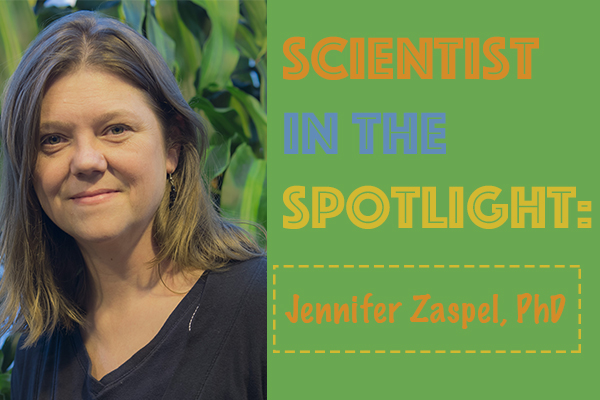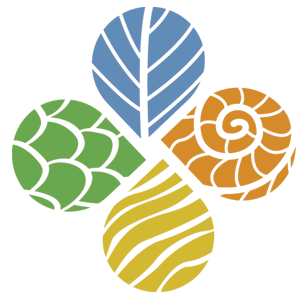In our newest series, "Scientist in the Spotlight" we’ll sit down with the ADBC (Advancing Digitization of Biodiversity Collections) program's best and brightest to learn more about what makes them tick. This month, we had a chance to speak with Jennifer Zaspel. She is the associate curator, head of zoology and director of Puelicher Butterfly Wing at the Milwaukee Public Museum. She is also the the head of the Terrestrial Parasite Tracker (TPT) TCN.
From my experience growing up in a smaller town, we just didn't hear much about jobs like that. You could be a firefighter. You could be a doctor. You could be a lawyer. We didn't have a lot of resources in terms of learning about different kinds of careers. Fortunately, things have changed now, and people are talking about different kinds of careers much earlier. All that being said, I’ve always been interested in biology.
As a kid, I was curious about the natural world. I spent a lot of time playing outdoors. I actually took a one semester natural history course in high school, where I learned about Minnesota bird, fish and mammal species. I’ve even tried, unsuccessfully at the time, to help our teacher curate our small insect teaching collection after school. At that point, I knew that I wanted to do something related to biology and the biological sciences, but even in high school I hadn’t made a final decision.
In one of my college evolutionary biology classes, we watched a film on the late Dr. Terry Erwin’s insect research in the tropics. At the end of the video, my professor said: “if I had to do it all over again, I would have become an entomologist and spent my life studying insects in the tropics.” That really resonated with me and I thought about it. I just decided that I was going to give that a shot. He sort of had this tone that it was too late for him, but if anybody is considering or contemplating their future, this would be a wonderful career path.
What is your current role and responsibilities at the Milwaukee Public Museum/TPT TCN?
I am the head of the Zoology department at the Milwaukee Public Museum. I oversee both the vertebrate and invertebrate collections here. I am also in charge of the Puelicher Butterfly Wing, which is our butterfly vivarium. Attached to that wing, is an exhibit area called Bugs Alive. There are some live insects and other arthropods in that space, which require rearing facilities with special conditions. I oversee the operations of both of those facilities.
For the last two years, I’ve also been the interim director of our exhibits program at the Milwaukee Public Museum. I manage our exhibits maintenance staff. I help plan and schedule traveling exhibits. I put together the contracts for the team of people that are required to set up those traveling exhibits.
As part of regular exhibits maintenance here at the Museum, we do science auditing, update labels, make repairs as needed and also fundraise for new exhibits. That's a part of my job that is very different from my other roles. That being said, it’s been so much fun and very rewarding.
Working with exhibits has given me a completely different perspective on science communication and how we can translate research from behind the scenes to a broader audience. It's been such a great way to connect with other teams in our Museum and learn more about how they function. I have been learning more about education and what our educators do. For example, how they set their programming and visitor engagements for the year. All of those components are kind of tied in some way to exhibits. It's just been fascinating to be in this role. I've learned so much about the museum, the public, myself and science. It's been one of those really good surprises of my career.
What do you like most about your job?
There are many researchers out there doing really great work every day. But I am not sure that they have the opportunity, right at their fingertips, to see what kind of an impact their research is making each day. When you work at a natural history museum, you can go out on the floors and visitors like a family, engaging with an exhibit. One that maybe you even helped provide content for – you are able to see how your research has reached this family.
It’s such an honor and a privilege to work for an organization that really values and prioritizes reaching diverse audiences and developing Community Partnerships and making sure that folks have an understanding and appreciation for the science that we do in the collections. It’s so inspiring to be working on Research one minute and then see how that work is translated to the public the next. it's almost magical to be in a place where you can experience the positive impact of science on a daily basis.
If you could learn to do anything, what would it be?
I wish I could learn to speak foreign languages. It's not just one language in particular, it's several. I have done a lot of fieldwork in Russia, so Russian is definitely on the list. I would love to maybe learn Chinese. Potentially, a Southeast Asian language. I know a little bit of Spanish but, there's lots of room for improvement.
I can't say really that I've had negative experiences trying to communicate with colleagues from other countries. We’ve always been able to figure it out every time, but it would just be nice to deepen those relationships with people and communicate using the same language. It would take those experiences to a new level.
What would you most like to tell yourself at age 20?
Some solid advice that was given to me when I was 20 was: “don't clench down.” The more open you are, the more opportunities you will have to do different things. You need to be open to as many different kinds of experiences as possible and see what fits. Be sure that you're meeting your needs too. I've had experiences over the years, where people have had challenges with that. They want to get an experience that will get them to a goal and once they are in that experience, they're not getting what they need out of it to achieve their goal. Things can be misaligned and we put pressure on ourselves to finish what we've started, and to have loyalty to projects, programs or even people. Be mindful, whether or not it’s a good match for your long-term goals and be okay with needing to make adjustments.
I would also say to try and collaborate with as many other people as possible. Try to serve on external leadership councils. Just keep exposing yourself to diverse perspectives whether it be in a research context or a something like the business of a professional society. Make sure that you stay active and engaged both within and outside of your institution. I think this is very important regardless of age and career stage.
What was the last experience that made you a stronger person?
I think probably for most of us, being in the current pandemic crisis. It is helping us build character and test the limits of what it is we can do and how we can move our lives forward, not only in terms of our professional lives, but our personal lives too. We are talking about doing life in a completely different way. Certainly, there are some things that are very efficient in our virtual working learning environments. There are other things that we've really had to work pretty hard at to maintain including relationships. Even, within our Terrestrial Parasite Tracker network, we had to work really hard at keeping everybody connected.
We’ve let folks know that when they’re able to access their collections again, we are here to help data providers get back into the swing of things and adjust workflows if needed for hybrid virtual models. Being in the natural history collections community and in the academic Community, there's still a lot of uncertainty with reopening facilities. I think that if there's any good that can come out of all of this, it’s that we're stronger and better people for it.
What do you like to do in your free time?
I am a very Northern woods girl, I guess you could say. I enjoy being in nature, outside, having campfires and things like that. I really enjoy hiking, fishing, swimming, kayaking, camping and any winter sport (ice skating, ice fishing, and cross country and skiing) in Northern Wisconsin and Northern Minnesota. Both my husband and I have family from northern Minnesota, so we are in those areas a lot. We lovelistening to loons (a bird) and being on the lakes in those areas where we can spend time with our families.









